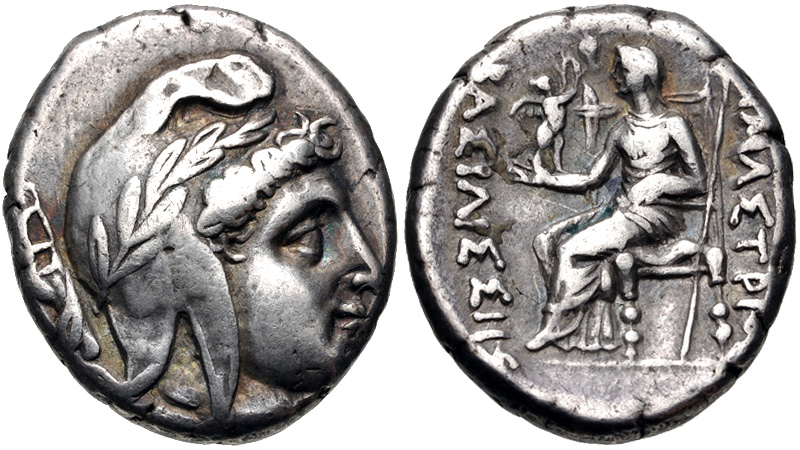Amastris (daughter Of Oxyathres) on:
[Wikipedia]
[Google]
[Amazon]
Amastris ( grc-gre, Ἄμαστρις; killed c. 284 BC) also called Amastrine, was a Persian princess, and
 After the death of
After the death of
Amastris 7
In: Paulys Realencyclopädie der classischen Altertumswissenschaft (RE). Vol. I,2, Stuttgart 1894, szpalta 1750. {{DEFAULTSORT:Amastris 4th-century BC women rulers 3rd-century BC women rulers People associated with Alexander the Great Achaemenid princesses Deaths by drowning Year of birth unknown Murdered royalty 4th-century BC Iranian people 280s BC deaths Heraclea Pontica Ancient Greek tyrants
Tyrant
A tyrant (), in the modern English usage of the word, is an absolute ruler who is unrestrained by law, or one who has usurped a legitimate ruler's sovereignty. Often portrayed as cruel, tyrants may defend their positions by resorting to rep ...
-ruler of the city of Heraclea from circa 300 to her death. She was the daughter of Oxyathres, the brother of the Persian King
This is a list of monarchs of Persia (or monarchs of the Iranian peoples, Iranic peoples, in present-day Iran), which are known by the royal title Shah or King of Kings#Iran, Shahanshah. This list starts from the establishment of the Medes aroun ...
Darius III
Darius III ( peo, 𐎭𐎠𐎼𐎹𐎺𐎢𐏁 ; grc-gre, Δαρεῖος ; c. 380 – 330 BC) was the last Achaemenid King of Kings of Persia, reigning from 336 BC to his death in 330 BC.
Contrary to his predecessor Artaxerxes IV Arses, Dar ...
.
Life
Amastris was given byAlexander the Great
Alexander III of Macedon ( grc, wikt:Ἀλέξανδρος, Ἀλέξανδρος, Alexandros; 20/21 July 356 BC – 10/11 June 323 BC), commonly known as Alexander the Great, was a king of the Ancient Greece, ancient Greek kingdom of Maced ...
in marriage to Craterus
Craterus or Krateros ( el, Κρατερός; c. 370 BC – 321 BC) was a Macedonian general under Alexander the Great and one of the Diadochi. Throughout his life he was a loyal royalist and supporter of Alexander the Great.Anson, Edward M. (20 ...
, however Craterus later decided to marry Phila
Phila may refer to a shortened name for the City of Philadelphia, U.S.
It may also refer to:
*Phila of Elimeia, sister of Derdas and wife of Philip II of Macedon
*Phila (daughter of Antipater), wife of Balacrus, Craterus and Demetrius Poliorcetes ...
, one of the daughters of Antipater
Antipater (; grc, , translit=Antipatros, lit=like the father; c. 400 BC319 BC) was a Macedonian general and statesman under the subsequent kingships of Philip II of Macedon and his son, Alexander the Great. In the wake of the collaps ...
. Still, he first arranged his wife's advantageous marriage to Dionysius
The name Dionysius (; el, Διονύσιος ''Dionysios'', "of Dionysus"; la, Dionysius) was common in classical and post-classical times. Etymologically it is a nominalized adjective formed with a -ios suffix from the stem Dionys- of the name ...
, tyrant
A tyrant (), in the modern English usage of the word, is an absolute ruler who is unrestrained by law, or one who has usurped a legitimate ruler's sovereignty. Often portrayed as cruel, tyrants may defend their positions by resorting to rep ...
of Heraclea Pontica, in Bithynia
Bithynia (; Koine Greek: , ''Bithynía'') was an ancient region, kingdom and Roman province in the northwest of Asia Minor (present-day Turkey), adjoining the Sea of Marmara, the Bosporus, and the Black Sea. It bordered Mysia to the southwest, Pa ...
, whom she married in 322 BC. She had two sons with him named Clearchus and Oxyathres.
 After the death of
After the death of Dionysius
The name Dionysius (; el, Διονύσιος ''Dionysios'', "of Dionysus"; la, Dionysius) was common in classical and post-classical times. Etymologically it is a nominalized adjective formed with a -ios suffix from the stem Dionys- of the name ...
, in 306, Amastris became guardian of their children. Several others joined in this administration. Amastris married Lysimachus
Lysimachus (; Greek: Λυσίμαχος, ''Lysimachos''; c. 360 BC – 281 BC) was a Thessalian officer and successor of Alexander the Great, who in 306 BC, became King of Thrace, Asia Minor and Macedon.
Early life and career
Lysimachus was b ...
in 302. However, he abandoned her shortly afterwards and married Arsinoe II, one of the daughters of Ptolemy I Soter
Ptolemy I Soter (; gr, Πτολεμαῖος Σωτήρ, ''Ptolemaîos Sōtḗr'' "Ptolemy the Savior"; c. 367 BC – January 282 BC) was a Macedonian Greek general, historian and companion of Alexander the Great from the Kingdom of Macedon ...
, the first Pharaoh of Ptolemaic Egypt.
After her marriage to Lysimachus ended, Amastris retired to Heraclea, which she governed as tyrant in her own right. She also founded shortly after 300 a city called after her own name Amastris, on the sea-coast of Paphlagonia, by the fusion ( synoecism) of the four smaller towns of Sesamus
Amasra (from Greek Amastris Ἄμαστρις, ''gen''. Ἀμάστριδος) is a small Black Sea port town in the Bartın Province, Turkey, formerly known as Amastris.
The town today is much appreciated for its beaches and natural setting, ...
, Cromna, Cytorus and Tium
Tium ( el, Τῖον) was an ancient settlement, also known as Filyos ( el, Φίλειος), on the south coast of the Black Sea at the mouth of the river Billaeus in present-day Turkey. Ancient writers variously assigned it to ancient Paphlagonia ...
. Tium later regained its autonomy, but the other three remained part of the city of Amastris' territory.
She was drowned by her two sons about 284 but the matricide was avenged by Lysimachus, who made himself master of Heraclea, and put both Clearchus and Oxyathres to death.
References
Sources
* *External links
* Ulrich WilckenAmastris 7
In: Paulys Realencyclopädie der classischen Altertumswissenschaft (RE). Vol. I,2, Stuttgart 1894, szpalta 1750. {{DEFAULTSORT:Amastris 4th-century BC women rulers 3rd-century BC women rulers People associated with Alexander the Great Achaemenid princesses Deaths by drowning Year of birth unknown Murdered royalty 4th-century BC Iranian people 280s BC deaths Heraclea Pontica Ancient Greek tyrants